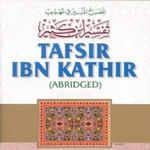
Tafsir Ibn Kathir English Complete part offline
advertisement
| İsim | Tafsir Ibn Kathir |
|---|---|
| Sürüm | 1.13 |
| Güncelleme | 13 Nis 2024 |
| Boyut | 108 MB |
| Kategori | Eğitim |
| Yükleme sayısı | 50B+ |
| Geliştirici | Islamic Books |
| Android OS | Android 6.0+ |
| Google Play ID | islamicbooks.tafsiribnkathir.english |
Tafsir Ibn Kathir · Açıklama
Tafsir Ibn Kathir is the most renowned and accepted explanation of the Quran in the entire world. In it one finds the best presentation of Hadith (stories), history, and scholarly commentary. Muslims consider it to be the best source based on the Quran and Sunnah. This Arabic work spans thousands of pages in five volumes. To cover all of the references, Ibn Kathir has also collected Hadith and Israelites stories. Tafsir Ibn Kathir is one of the Most Comprehensive and Complete Explanations of The Noble Quran. In it one finds the best presentation of Hadith, history, and scholarly commentary. All of the authentic sayings of the Prophet Mohammad (peace be upon him) are presented in Arabic along with the diacritics. Muslims all over the world use it as a trusted source of Tafsir of the Quran and Sunnah. It is a resource that all libraries or personal collections of English Islamic books should have.
We have tried to make the app best for the user to read as easy and comfortable. We have included some essentials tools and features to make the app like real hard copy books flavours and feels.
✓☆ Full screen mode.
✓☆ Night mode.
✓☆ Pin page.
✓☆ Swipe horizontal reading mode like books.
✓☆ Vertical scrolling reading mode.
✓☆ Search by page number.
✓ Screenshot share to Facebook,twitter , whats-app and others sharing sites.
In'Sha Allah this app will be helpful to read the tafsir easily ☺️ ☺️
About Author and Tafsir:
His full name was Abū l-Fidāʾ Ismāʿīl ibn ʿUmar ibn Kaṯīr (أبو الفداء إسماعيل بن عمر بن كثير) and had the laqab (epithet) of ʿImād ad-Dīn (عماد الدين "pillar of the faith"). His family trace its lineage back to the tribe of Quraysh. He was born in Migdal, a village on the outskirts of the city of Busra, in the east of Damascus, Syria, around about AH 701 (AD 1300/1).[9] He was taught by Ibn Taymiyya and Al-Dhahabi.
Upon completion of his studies he obtained his first official appointment in 1341, when he joined an inquisitorial commission formed to determine certain questions of heresy.[4]
He married the daughter of Al-Mizzi, one of the foremost Syrian scholars of the period, which gave him access to the scholarly elite. In 1345 he was made preacher (khatib) at a newly built mosque in Mizza, the hometown of his father-in-law. In 1366, he rose to a professorial position at the Great Mosque of Damascus.[4][10]
In later life, he became blind.[8][10] He attributes his blindness to working late at night on the Musnad of Ahmad Ibn Hanbal in an attempt to rearrange it topically rather than by narrator. He died in February 1373 (AH 774) in Damascus. He was buried next to his teacher Ibn Taymiyya.[11]
We have tried to make the app best for the user to read as easy and comfortable. We have included some essentials tools and features to make the app like real hard copy books flavours and feels.
✓☆ Full screen mode.
✓☆ Night mode.
✓☆ Pin page.
✓☆ Swipe horizontal reading mode like books.
✓☆ Vertical scrolling reading mode.
✓☆ Search by page number.
✓ Screenshot share to Facebook,twitter , whats-app and others sharing sites.
In'Sha Allah this app will be helpful to read the tafsir easily ☺️ ☺️
About Author and Tafsir:
His full name was Abū l-Fidāʾ Ismāʿīl ibn ʿUmar ibn Kaṯīr (أبو الفداء إسماعيل بن عمر بن كثير) and had the laqab (epithet) of ʿImād ad-Dīn (عماد الدين "pillar of the faith"). His family trace its lineage back to the tribe of Quraysh. He was born in Migdal, a village on the outskirts of the city of Busra, in the east of Damascus, Syria, around about AH 701 (AD 1300/1).[9] He was taught by Ibn Taymiyya and Al-Dhahabi.
Upon completion of his studies he obtained his first official appointment in 1341, when he joined an inquisitorial commission formed to determine certain questions of heresy.[4]
He married the daughter of Al-Mizzi, one of the foremost Syrian scholars of the period, which gave him access to the scholarly elite. In 1345 he was made preacher (khatib) at a newly built mosque in Mizza, the hometown of his father-in-law. In 1366, he rose to a professorial position at the Great Mosque of Damascus.[4][10]
In later life, he became blind.[8][10] He attributes his blindness to working late at night on the Musnad of Ahmad Ibn Hanbal in an attempt to rearrange it topically rather than by narrator. He died in February 1373 (AH 774) in Damascus. He was buried next to his teacher Ibn Taymiyya.[11]
























